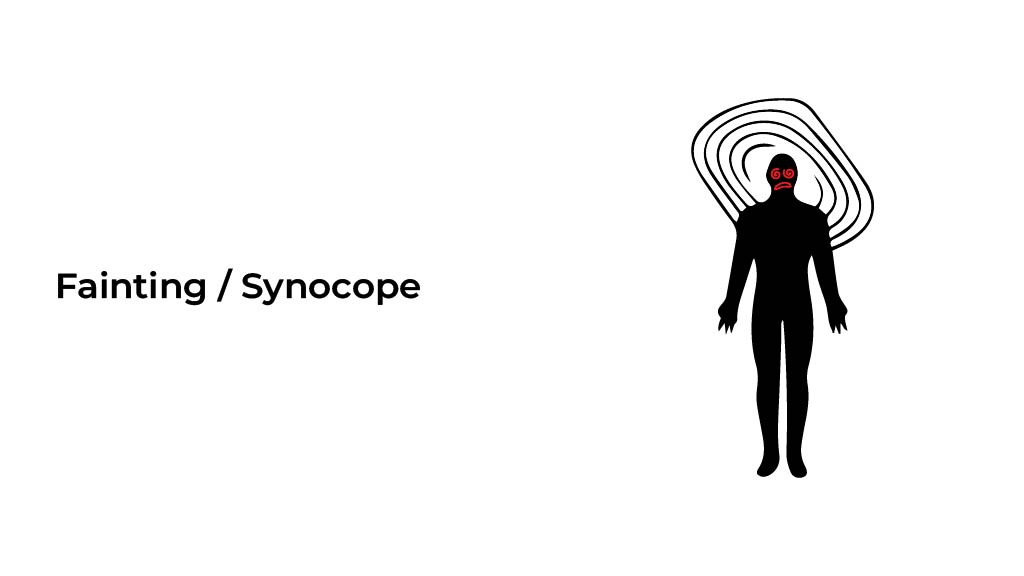
Fainting is a temporary loss of consciousness. It is caused by a sudden/eventually decreased blood flow to the brain. Episodes last up to a few minutes or seconds, and then the person wakes up and returns to normal position. Fainting is a loss of consciousness for a short period caused by a sudden drop of blood flow to the brain. Fainting is also known as;
- Loss of consciousness
- Decreased consciousness
- Passing out
- Syncope
Signs and symptoms of fainting
Before fainting, you may feel like;- Dizziness
- Lightheaded
- Hot and suddenly sweat come
- Cold and clammy
- Nausea
- Stressed
- Weakness
- Sweating
- Get a headache
- Fall down
- Paleness
- Changes in vision
- Hear a ringing in the ears
- Loss of control of muscles
Types of fainting
Fainting is not a sign of a severe health problem, but sometimes it can be. The most common cause of fainting is a sudden drop in blood pressure, which lowers the blood flow and oxygen to the brain. There are several reasons why blood pressure drops, leading to temporary loss of consciousness.1. Cardiac syncope
Fainting due to a heart problem called cardiac syncope. Different heart conditions can affect the oxygenated blood pumped to the brain. It appears suddenly without dizziness. In some cases, fainting is not a sign of a life-threatening problem, but some people with cardiac syncope have severe underlying medical conditions.2. Carotid sinus syncope
This type of fainting occurs when the carotid artery in the neck is pinched. The carotid artery is a blood vessel that supplies blood to the brain. This type of syncope occurs when someone is wearing a very tight collar, stretching, and turning the neck too much, which pinch the artery.3. Situational syncope
Certain body functions and movements can naturally cause a drop in blood pressure that may cause fainting—some triggers of situational fainting are coughing, swallowing, pooping, etc.4. Vasovagal syncope
This type of fainting can occur when a person is under stress. Examples include emotional stress, the sight of blood, physical or emotional pain, or trauma. The stressful events restore a bodily reflex called the vasovagal syncope. In this situation, the heart slows down and pumps less blood, leading to a drop in blood pressure. Then the person doesn’t get oxygenated blood to the brain and becomes faint.Causes of fainting
Causes of fainting or syncope include;- Certain medications (diuretics, calcium channel blockers, ACE inhibitors)
- Dehydration
- Overheating
- Neurological conditions (seizures)
- Diabetes (a sudden drop in blood sugar)
- Skipping meals
- Hyperventilation (breathing too fast)
- Exercising in the heat
- Working or playing
- Standing up quickly
- Using alcohol
- Poor circulation
- Coughing too hard
- Allergies
- Depression
- Anxiety
- Chronic lungs diseases
- Anemia
- Nervous system problem
Action against fainting
If someone loses consciousness;- Check the person’s breathing.
- Check the person’s heartbeat.
- Make sure that the person’s airway is clear.
- Seek immediate medical attention if the condition is severe.
- Lie down or sit down the patient for 10 minutes.
- Check for any injury that needs medical attention.
- Suggest sitting forward and lowering their head below their shoulders and knees.
- Give ice or cold water.
Prevention
Pay attention to yourself and other activities and situations that trigger/stimulate fainting. When you know what causes the fainting, you avoid them, such as getting up quickly causes fainting, taking time for standing. Some strategies to prevent fainting are the following;- Make a fist first
- Cross your legs
- Tense your arms
- Squeeze your thighs together
- Avoid overheating
- Keep blood circulating
- Stay hydrated
- Avoid certain medications that trigger fainting
- Remove the dangerous things around the patient
- Do not leave the patient alone
Discuss fainting with the doctor
Seek medical attention;- When you have any injury due to syncope/fainting.
- If you have repeated, frequent faints.
- If you take a long time to regain consciousness.
- Chest pain
- Blurry vision
- Confused during talking
- Irregular heartbeats
- Shortness of breath
- Long term loss of consciousness
- Pregnant
- Diabetic
- Heart problem
Diagnosis and tests
If you have no history of fainting but become faint several times, your doctor will find out the underlying cause of fainting. Your doctor will question what you were doing and what you felt before and after fainting. Give complete medical history to the doctor; otherwise, the doctor will not completely understand the situation. A doctor can do the following tests to find out more reasons;- Holter-monitor: Wearable portal heart monitoring device.
- Echocardiogram: In this test, sound waves are produced to give a picture of the heart.
- Electroencephalogram: EEG measures/determine the activity of the brain.
- CT scan of the head: Check the bleeding in the brain. Imaging technology.
- Electrocardiogram: It records the heart activity.
References:
- https://my.clevelandclinic.org/health/symptoms/21699-fainting
- https://www.webmd.com/brain/understanding-fainting-symptoms
- https://www.webmd.com/brain/understanding-fainting-basics
- https://www.healthline.com/health/fainting
- https://www.mayoclinic.org/diseases-conditions/vasovagal-syncope/diagnosis-treatment/drc-20350531